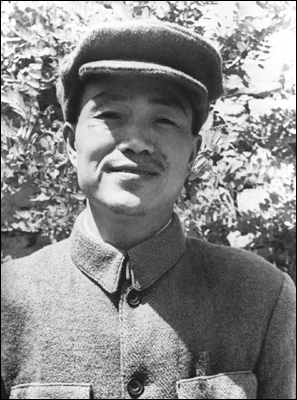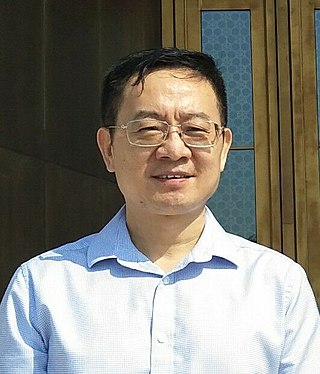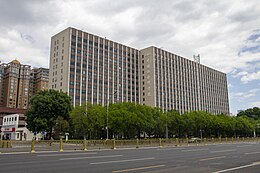
The Chinese Academy of Sciences is the national academy for natural sciences and the highest consultancy for science and technology of the People's Republic of China. It is the world's largest research organization, with 100 research institutes, 3 universities, 69 thousand full-time employees, and 79 thousand graduate students.
The Achang language is a Tibeto-Burman language spoken by the Achang in Yunnan, China, and northern Myanmar.
The Kam–Tai languages, also called Dong–Tai or Zhuang–Dong in China, are a proposed primary branch of the Kra–Dai language family. However, since the 2000s in China, the names Dong–Tai and Zhuang–Dong have been used to refer to the entire Kra–Dai language family, including the Kra languages, due to the extensive documentation and comparative work done on Kra languages in China starting from the 2000s.

E or Wuse/Wusehua is a Tai–Chinese mixed language spoken primarily in Rongshui Miao Autonomous County, Guangxi, China. It contains features of both Tai and Chinese varieties, generally adopting Chinese vocabulary into Tai grammar. E is a tonal language—distinguishing between seven tones—and contains a few rare phonemes: voiceless versions of the more common nasal consonants and alveolar lateral approximant.
Xue Zongzheng is a Chinese historian, a director of Ancient History at the Institute of History in Xinjiang Academy of Social Sciences, and a professor of History at Xinjiang Normal University. Born in Jinan, Shandong, he graduated with a history degree from Peking University in 1958, specializing in frontier policies of ancient China and the history of Central Asia. He published several books in Chinese.

Hu Qiaomu was a Chinese sociologist, Marxist philosopher and politician.

The Lolo-Burmese languages of Burma and Southern China form a coherent branch of the Sino-Tibetan family.

The Graduate School of Chinese Academy of Social Sciences is a public graduate school in Beijing, and one of the first two graduate schools established in the People’s Republic of China.

Xiandai Hanyu Cidian, also known as A Dictionary of Current Chinese or Contemporary Chinese Dictionary is an important one-volume dictionary of Standard Mandarin Chinese published by the Commercial Press, now into its 7th (2016) edition. It was originally edited by Lü Shuxiang and Ding Shengshu as a reference work on modern Standard Mandarin Chinese. Compilation started in 1958 and trial editions were issued in 1960 and 1965, with a number of copies printed in 1973 for internal circulation and comments, but due to the Cultural Revolution the final draft was not completed until the end of 1977, and the first formal edition was not published until December 1978. It was the first People's Republic of China dictionary to be arranged according to Hanyu Pinyin, the phonetic standard for Standard Mandarin Chinese, with explanatory notes in simplified Chinese. The subsequent second through seventh editions were respectively published in 1983, 1996, 2002, 2005, 2012 and 2016.
Shen Jiaxuan(Chinese: 沈家煊; pinyin: Shěn Jiāxuān) is a Chinese linguist. He is the director of The Institute of Linguistics of the Chinese Academy of Social Sciences and the president of International Chinese Association. He is also the chief editor of "contemporary linguistics".
Piyo is a Loloish language of China. The people are ethnic Hani, and the "Bi-Ka" varieties are traditionally considered dialects of Hani. However, in the classifications of Bradley (2007) and Lama (2012), they are more distinct from Hani than other related languages are. Lama classifies Mpi as closer to Biyo dialect than Kaduo is.

Utopia University, known in Chinese as Datong or Tatung University, was a private university in Shanghai. It was established in March 1912 by a group of former Tsinghua faculty members led by Hu Dunfu, and became one of the most reputable private universities in China. After the founding of the People's Republic of China, the Chinese Communist Party government closed Utopia along with many other private universities in 1952. Its departments, faculty members, and students were divided and merged into various universities in Shanghai.
The Dongping dialect is a Mandarin Chinese dialect spoken in Dongping County in Shandong province, China.
She or Shehua is an unclassified Sinitic language spoken by the She people of Southeastern China. It is also called Shanha, San-hak (山哈) or Shanhahua (山哈话). She speakers are located mainly in Fujian and Zhejiang provinces of Southeastern China, with smaller numbers of speakers in a few locations of Jiangxi, Guangdong and Anhui provinces.
Ye Tan is a Chinese economist and a research professor at the Institute of Economics of the Chinese Academy of Social Sciences since 1988. In 2012, she was appointed as an adjunct professor at Peking University School of Economics. She is a member of the NSFC peer councillor, member of the 19th-century Japanese Society for Economic and Social Studies, and vice president of the Chinese Association of historic Economic Thought. She is the director of the Academy of History of Chinese Economic Thought.
China Social Sciences Press, also known as Social Sciences in China Press, is a Chinese state-level publishing house sponsored and managed by the Chinese Academy of Social Sciences, which publishes academic works in the humanities and social sciences.
Hu Ruizhong is a Chinese geologist and member of the Chinese Academy of Sciences. He was a delegate to the 12th National People's Congress.
Hu Shihua was a Chinese mathematician. He was a member of the Chinese Academy of Sciences.
Wang Weiguang is a Chinese politician who served as president of the University of Chinese Academy of Social Sciences from 2017 to 2018 and president of the Chinese Academy of Social Sciences from 2013 to 2018. He previously served as vice president of the academy and before that, vice president of the Central Party School of the Chinese Communist Party. He was a delegate to the 10th National People's Congress. He was a representative of the 19th National Congress of the Chinese Communist Party. He is a member of the 13th National Committee of the Chinese People's Political Consultative Conference.

Gao Xiang is a Chinese historian and politician, currently serving as Chinese Communist Party Committee Secretary and president of the Chinese Academy of Social Sciences and president of the Chinese Academy of History.









